

![13 Best Online Learning Platforms for Businesses [2025]](https://cdn.prod.website-files.com/62f0b227e38c6d799afcd8ba/66a7484a2d64d0f0e4b615cb_Top13_Online_Course-min.avif)
![13 Best Online Learning Platforms for Businesses [2025]](https://cdn.prod.website-files.com/62d6876535c5c7559909754c/67c036910fbf3721b5778e27_Attendance_Zoom-min%201.png)

Key Takeaways
- Online course platforms provide the tools to create, host, and sell courses, making education more accessible and scalable.
- They offer key features like multimedia support, quizzes, and community engagement to enhance the learning experience.
- With built-in marketing and monetization options, these platforms help educators and entrepreneurs reach a wider audience and generate revenue
Introduction
The global online learning market is expected to surpass $450 billion by 2028, reflecting the growing adoption of online education worldwide. This shift has redefined how knowledge is shared and consumed, making learning accessible for individuals and businesses alike. The increasing demand for flexible, scalable, and engaging learning solutions has driven innovation, creating numerous opportunities for educators and businesses to thrive in the education technology sector.
Online learning platforms have become indispensable tools for creating and delivering courses. These platforms empower educators and organizations to develop interactive and engaging content, making learning more efficient and enjoyable. With features such as gamification, progress tracking, and mobile accessibility, they cater to diverse needs. For businesses, these platforms serve as effective tools for employee training and skill development, offering convenience and cost efficiency.
This blog presents 13 of the best online learning platforms for business and education. Each platform offers unique features that address various learning requirements, making them excellent choices for educators, entrepreneurs, and corporate trainers:
- EdisonOS
- Thinkific
- LearnWorlds
- Podia
- Simplero
- Kajabi
- Academy of Mine
- Udemy
- Skillshare
- Coursera
- LearnDash
- Lifter LMS
- Masterstudy LMS
These platforms provide versatile solutions for creating, managing, and delivering online courses, helping users meet their education and training goals effectively.
What is an online learning platform?

An online learning platform is a website or app that helps people teach and learn. It gives teachers the tools to create courses, track student progress, and give tests or assignments. Students can access lessons, complete tasks, and see how they're doing. It's like a virtual classroom where everyone can connect, share resources, and learn together.
Online learning platforms are widely used by educators, students, and businesses. Educators use them to share knowledge with broader audiences and develop interactive learning experiences. Businesses leverage these platforms to train employees and upskill their workforce efficiently. For learners, the flexibility and accessibility of these platforms make them a practical solution for gaining knowledge and developing skills.
The significance of online learning platforms continues to grow as technology advances. They play a key role in breaking down barriers to education, making learning opportunities accessible to more people. As education and workplace requirements evolve, these platforms provide a practical way to keep up with the demand for new skills and knowledge.
Comparison Table : Top 10 Online learning platform for Businesses in 2025
We have reviewed numerous online learning platforms and came up with the below list of the top 13 e-learning platforms for businesses in 2025. These platforms were evaluated based on their features, usability, and overall effectiveness for corporate training and development.
In-depth review of the Best 10 online training platforms for Employees in 2025
1. EdisonOS
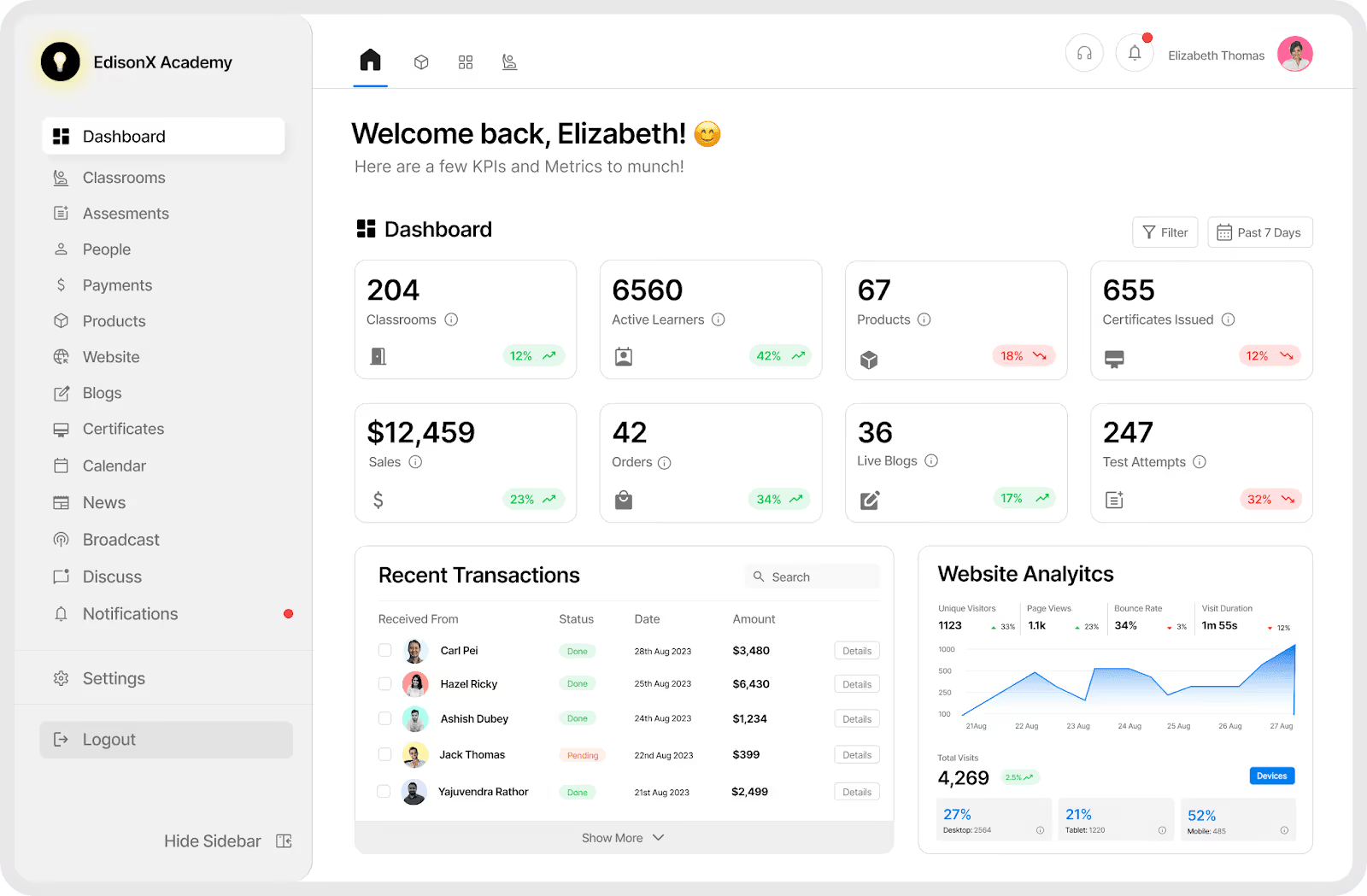
Overview
EdisonOS is a cutting-edge Learning Management System (LMS) designed to empower educators and businesses with customizable e-learning tools. Perfect for both small-scale instructors and enterprise-level training, EdisonOS provides a highly intuitive platform to create, manage, and distribute courses effortlessly. Its standout features include advanced gamification options, robust analytics for tracking learner progress, and seamless integrations with third-party tools. With a strong focus on user engagement and scalability, EdisonOS enables creators to deliver exceptional learning experiences. Choose EdisonOS to unlock the full potential of your educational initiatives.
Key Features
- Intuitive course builder with drag-and-drop functionality.
- Gamification tools to boost learner engagement.
- Advanced analytics and reporting to track progress and outcomes.
- Flexible integrations with external apps and tools.
- Secure and scalable infrastructure.
Pros
- Easy-to-use interface.
- Wide range of interactive features.
- Reliable analytics for data-driven decisions.
- Customization options for branding and course structure.
Cons
- Limited marketing tools compared to some competitors.
- Pricing may not suit smaller educators.
Integrations
Zapier, Google Workspace, Stripe, PayPal.
Pricing
- EdisonOS offers a subscription-based pricing model with two main plans:some text
- Basic Plan: Starts at $159/month.
- Growth Plan: Begins at $369/month.
- Custom quotes based on needs.
- Looking for a platform with Digital SAT Mocks? Pricing Here.
Rating
4.7/5
Reviews
"Edison OS mirrors Bluebook, helping my students manage test anxiety and boost SAT scores by 200 points. Its data tracking, flexibility, and responsiveness are five-star. Highly recommend!"
- Tina Wiles | CEO | My2tor
2. Thinkific
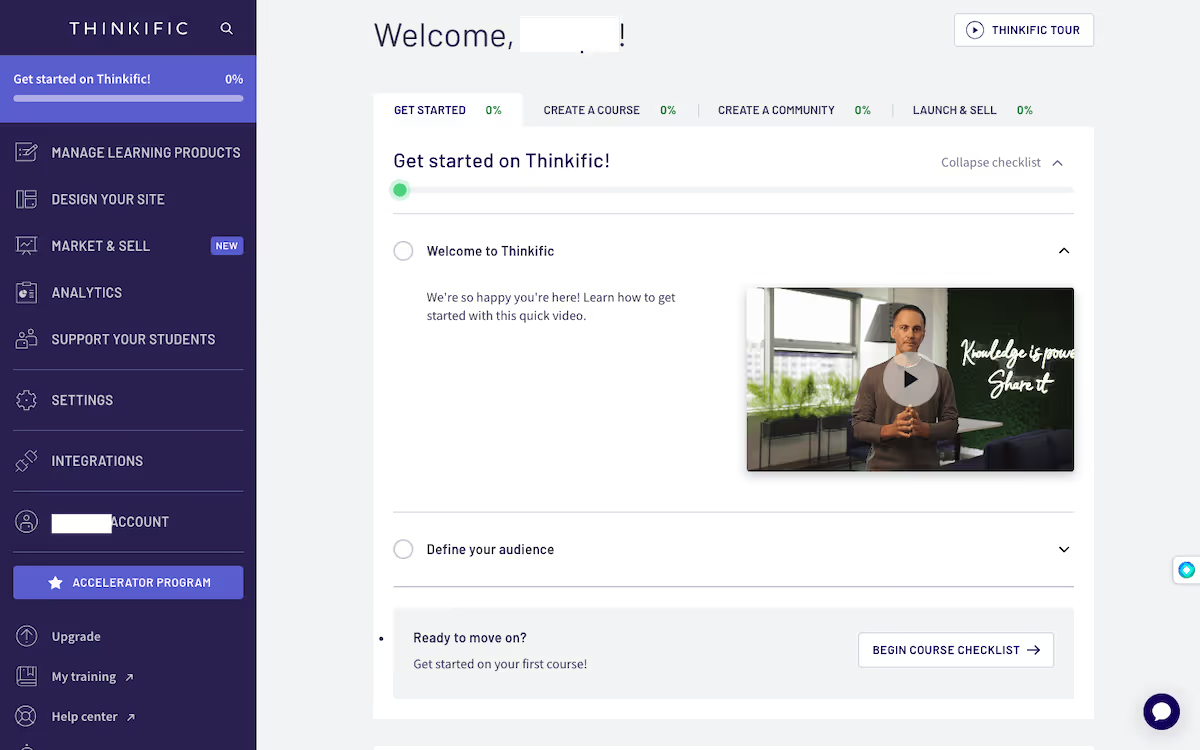
Overview
Thinkific is a popular platform in the LMS space, tailored for entrepreneurs and educators who want to create, market, and sell online courses. With Thinkific, users can build polished course websites without any technical expertise, thanks to its drag-and-drop interface. Features like built-in marketing tools, custom branding options, and seamless student management make Thinkific a go-to choice for course creators aiming to monetize their expertise. Ideal for building a thriving online business, Thinkific combines functionality with simplicity.
Key Features
- Drag-and-drop builder.
- Marketing tools like coupons and landing pages.
- Subscription and membership options.
- Secure payment integrations.
Pros
- Beginner-friendly.
- Good marketing and sales features.
- Flexible monetization options.
Cons
- Limited advanced reporting.
- Requires third-party apps for some functionalities.
Integrations
Zapier, Mailchimp, Stripe, PayPal.
Pricing
Free plan available; paid plans from $49/month.
Rating
4.6/5
Reviews
G2 : (200+)
Capterra : (100+)
3. LearnWorlds
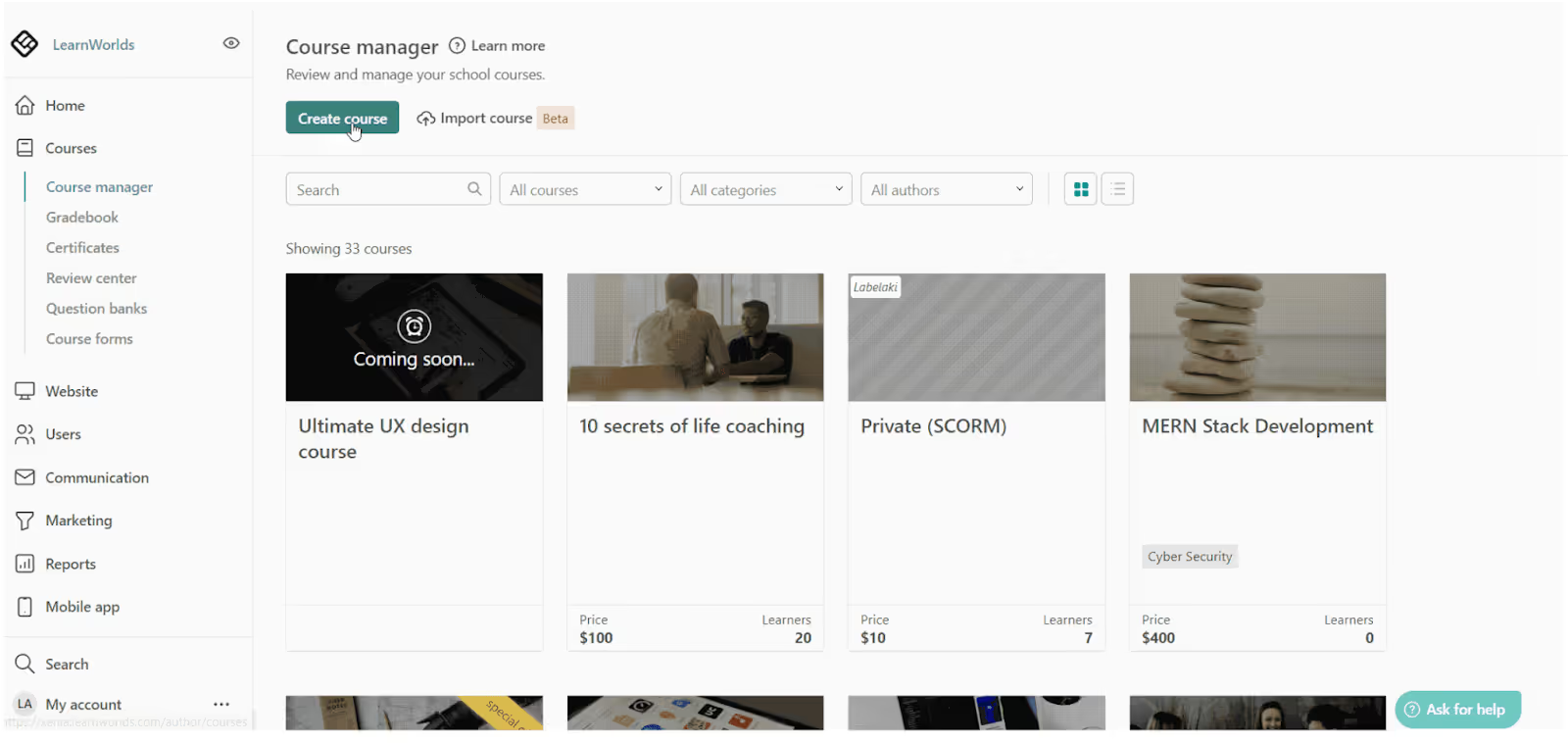
Overview
LearnWorlds stands out in the e-learning space as a versatile and highly interactive LMS. Known for its unique video editing tools and diverse content delivery options, it helps educators and organizations create truly engaging courses. LearnWorlds offers features such as gamified learning, in-depth analytics, and ready-to-use course templates to accelerate your course creation process. It’s perfect for users who value customization and learner engagement at scale.
Key Features
- Built-in video editor.
- Interactive tools for quizzes and certificates.
- Advanced branding options.
- Marketing and analytics features.
Pros
- Comprehensive interactivity.
- Strong branding customization.
- Scalable solutions.
Cons
- Higher learning curve.
- Premium features can be costly.
Integrations
Zapier, Zoom, Stripe, Mailchimp.
Pricing
Plans start at $29 per month
Rating
4.7/5
Reviews
G2 : (300+)
Capterra : (100+)
4. Podia
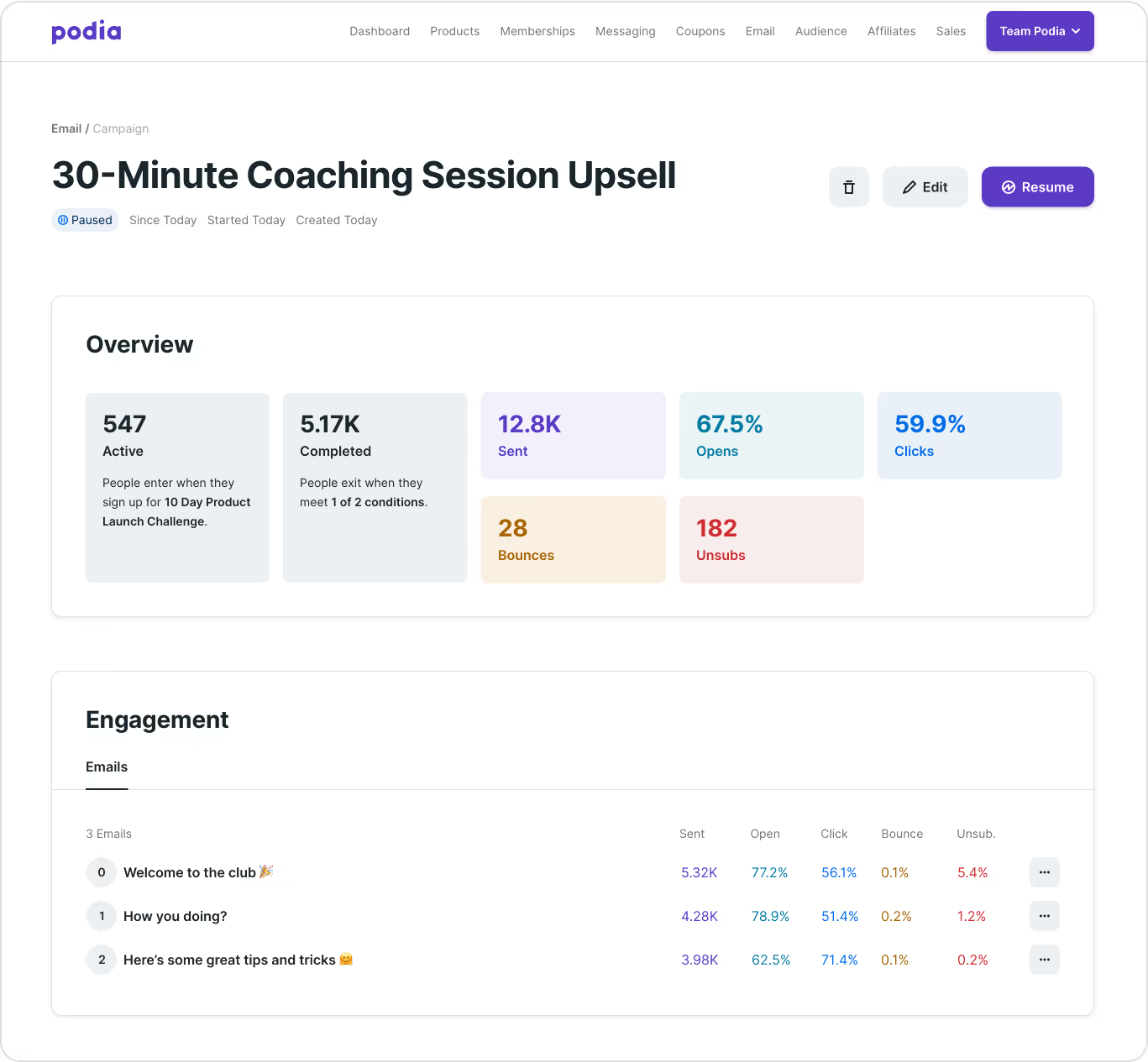
Overview
Podia is an all-in-one platform for creators looking to sell courses, memberships, and digital products. Designed with simplicity in mind, Podia eliminates the need for multiple tools by offering course hosting, marketing, and payment processing in one package. Its standout features include unlimited courses, built-in email marketing, and zero transaction fees. Podia is particularly well-suited for independent creators who want a hassle-free solution to scale their digital businesses.
Key Features
- Online storefront for courses and products.
- Membership management tools.
- Email marketing integration.
- Secure payment processing.
Pros
- User-friendly interface.
- Affordable pricing.
- Great for selling digital products.
Cons
- Limited advanced customization.
- Basic analytics.
Integrations
Stripe, PayPal, Zapier.
Pricing
Plan Starts at $39 per month.
Rating
4.5/5
Reviews
G2 : (20+)
Capterra : (100+)
5. Simplero
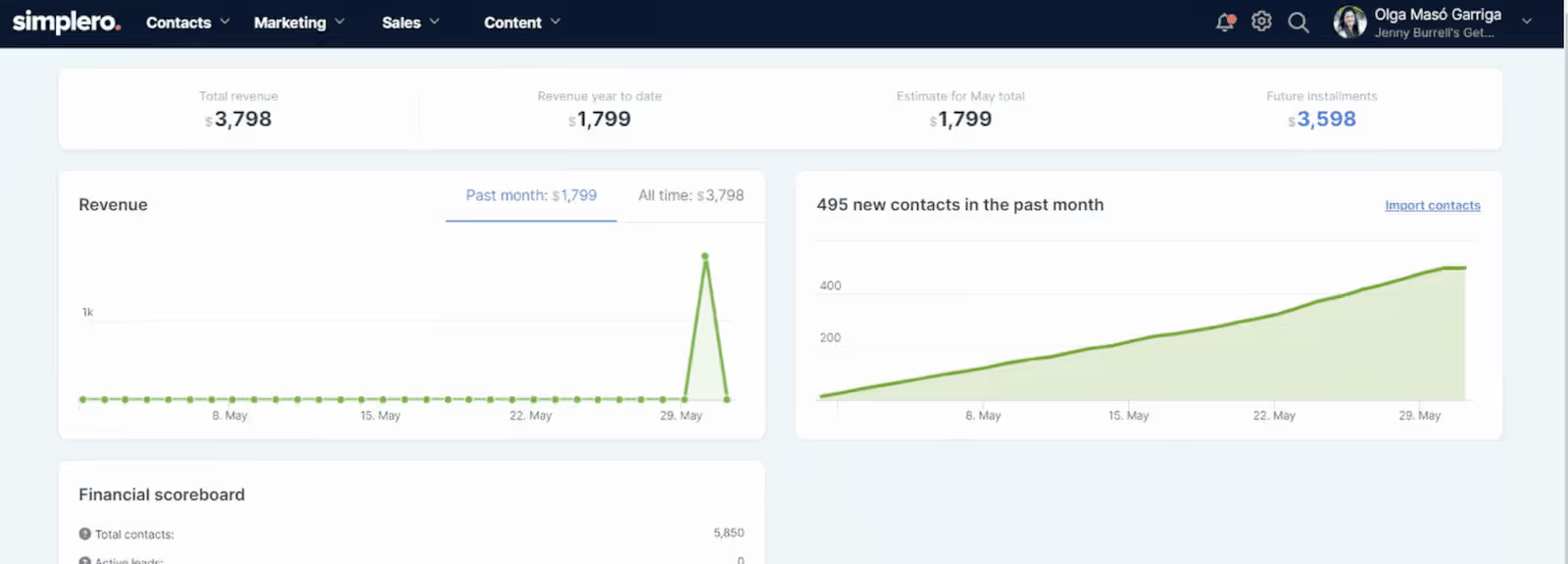
Overview
Simplero combines the power of a marketing suite with a robust LMS, making it a unique choice for entrepreneurs and coaches. It offers tools for email automation, sales funnels, and course management, all in one cohesive platform. Simplero emphasizes simplicity and personal growth, enabling users to focus on building meaningful connections with their audiences while scaling their businesses. Its blend of functionality and philosophy makes it an appealing option for purpose-driven creators.
Key Features
- Built-in CRM and email marketing.
- Course creation and management tools.
- Automations for marketing campaigns.
- Secure hosting and payments.
Pros
- All-in-one functionality.
- Strong marketing automation tools.
- No need for external apps.
Cons
- Higher pricing for smaller businesses.
- Limited design flexibility.
Integrations
Zapier, Stripe, PayPal.
Pricing
Plan starts at $70 per month
Rating
4.6/5
Reviews
G2 : (10+)
Capterra : (20+)
6. Kajabi
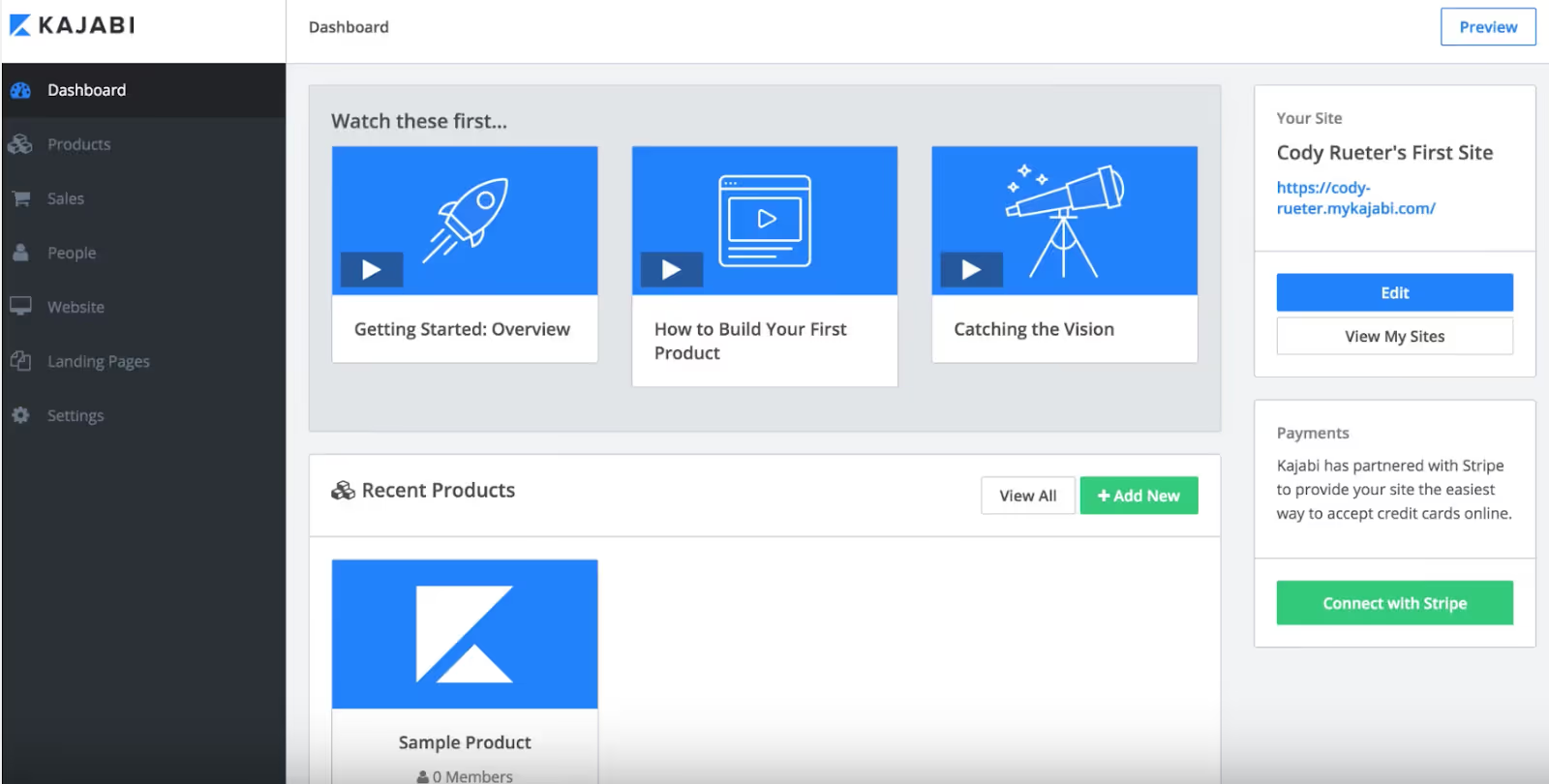
Overview
Kajabi is a premium platform designed for knowledge entrepreneurs to create and market online courses, podcasts, and memberships. Renowned for its all-in-one functionality, Kajabi provides tools for website building, email marketing, and course management. Its advanced automation capabilities and professional design options set it apart. Kajabi is ideal for those looking to build a highly branded, scalable business without relying on third-party tools.
Key Features
- Course creation and hosting.
- Marketing automation tools.
- Website builder and customizable templates.
- Membership options.
Pros
- Full marketing suite.
- Customizable design tools.
- Strong support for memberships.
Cons
- Expensive for small creators.
- Steeper learning curve.
Integrations
Zapier, Stripe, PayPal.
Pricing
Starts at $149 per month
Rating
4.7/5
Reviews
G2 : (50+)
Capterra : (100+)
7. Academy of Mine
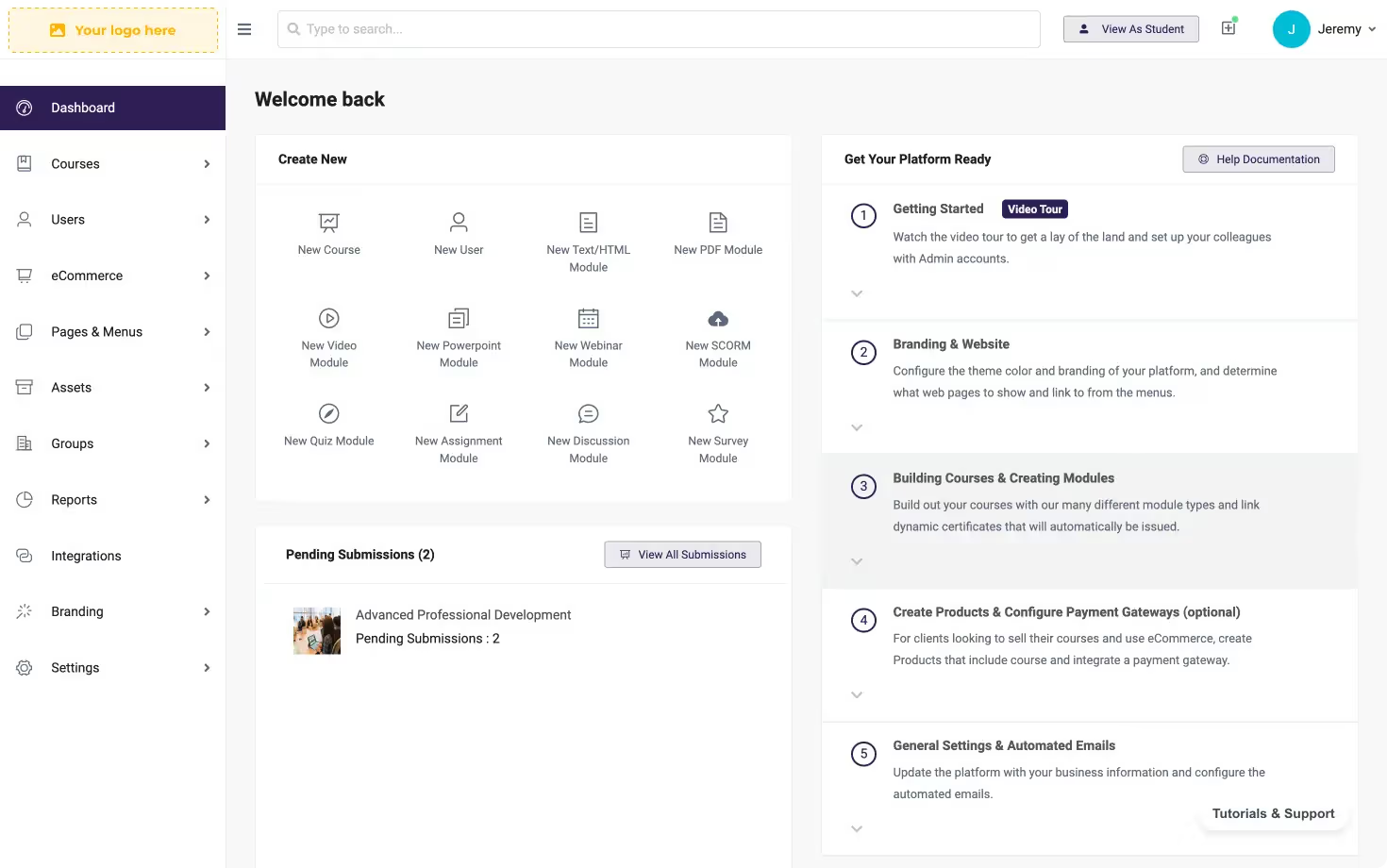
Overview
Academy of Mine is a customizable LMS tailored for businesses and professionals offering training and certifications. With a focus on industries like healthcare, legal, and corporate training, it offers robust compliance tracking, custom reporting, and white-label solutions. Academy of Mine stands out for its tailored approach, ensuring businesses get exactly what they need to meet their goals.
Key Features
- Custom course creation.
- Certification management.
- Reporting and analytics.
- SCORM compliance.
Pros
- Industry-specific customizations.
- Strong compliance tools.
- Scalable for enterprises.
Cons
- Limited out-of-the-box templates.
- High starting price.
Integrations
Zapier, SCORM-compliant tools, payment gateways.
Pricing
Custom pricing based on business needs.
Rating
4.5/5
Reviews
G2 : (2)
Capterra : (40+)
8. Udemy
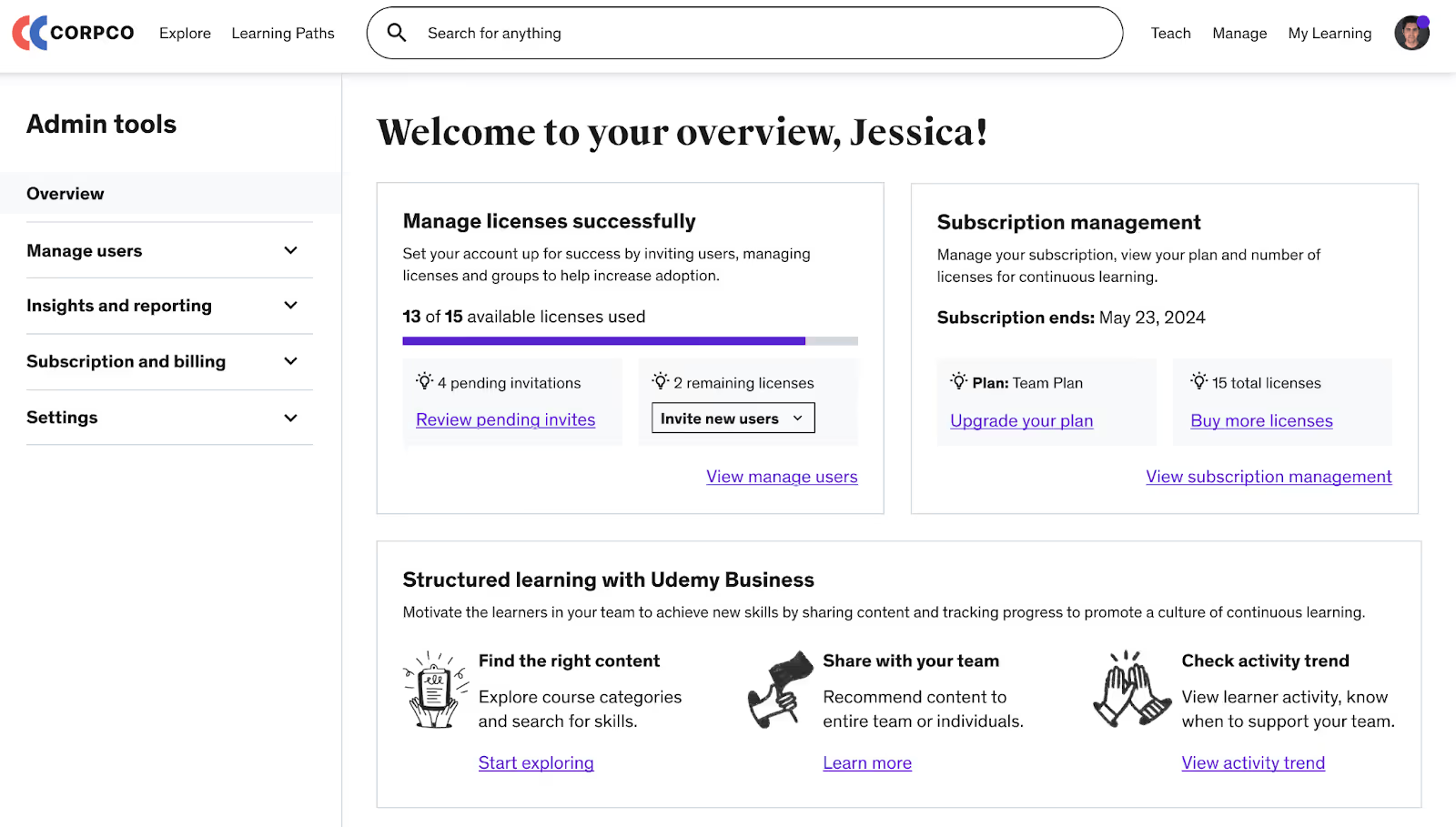
Overview
Udemy is one of the largest online course marketplaces, hosting millions of learners and thousands of courses across virtually every subject. It’s an ideal platform for instructors looking to reach a broad audience quickly. With its ready-made marketplace, user-friendly course creation tools, and marketing support, Udemy is perfect for educators looking to monetize their expertise with minimal overhead.
Key Features
- Massive course catalog.
- Tools for course creation and publishing.
- Built-in marketing features.
- Revenue sharing model.
Pros
- Wide audience reach.
- Easy-to-use publishing tools.
- Free to start for creators.
Cons
- Limited control over pricing.
- High platform fees.
Integrations
Limited direct integrations; supports external tools via API.
Pricing
Revenue-sharing model; free to join.
Rating
4.4/5
Reviews
G2 : (500+)
Capterra : (100+)
9. Skillshare
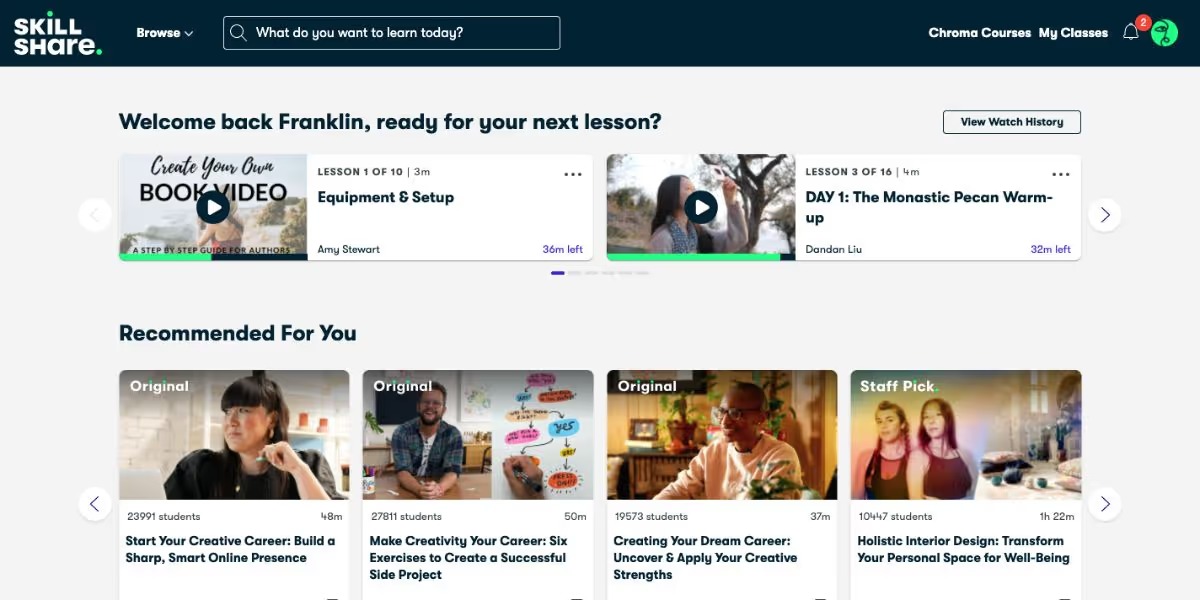
Overview
Skillshare is a community-driven learning platform focused on creativity, business, and personal development. It offers subscription-based access to thousands of short, engaging courses. Skillshare is perfect for instructors who want to focus on creative disciplines while tapping into a community of motivated learners. Its emphasis on practical, project-based learning makes it a favorite for creatives.
Key Features
- Video hosting and class organization.
- Community features for learners.
- Royalty-based payment for instructors.
Pros
- Large creative audience.
- Easy class creation.
- Recurring royalty income.
Cons
- Limited marketing tools.
- Focused on specific niches.
Integrations
Limited integrations; primarily self-contained platform.
Pricing
Revenue-sharing for creators; membership required for learners.
Rating
4.5/5
Reviews
G2 : (40+)
Capterra : (10+)
10. Coursera

Overview
Coursera is a globally recognized platform offering university-backed courses, professional certifications, and degrees. It’s ideal for individuals seeking high-quality, accredited education from top institutions. With features like peer-reviewed assignments, industry-aligned certifications, and a wide array of topics, Coursera bridges the gap between formal education and self-paced learning.
Key Features
- Wide range of courses and specializations.
- Certification and degree options.
- Flexible learning schedules.
Pros
- Renowned institutional partnerships.
- High-quality content.
- Options for certifications and degrees.
Cons
- Limited creator opportunities.
- High course fees for learners.
Integrations
Integrates with institutional tools and platforms.
Pricing
Revenue-sharing model for instructors.
Rating
4.6/5
Reviews
G2 : (400+)
Capterra : (20+)
11. LearnDash
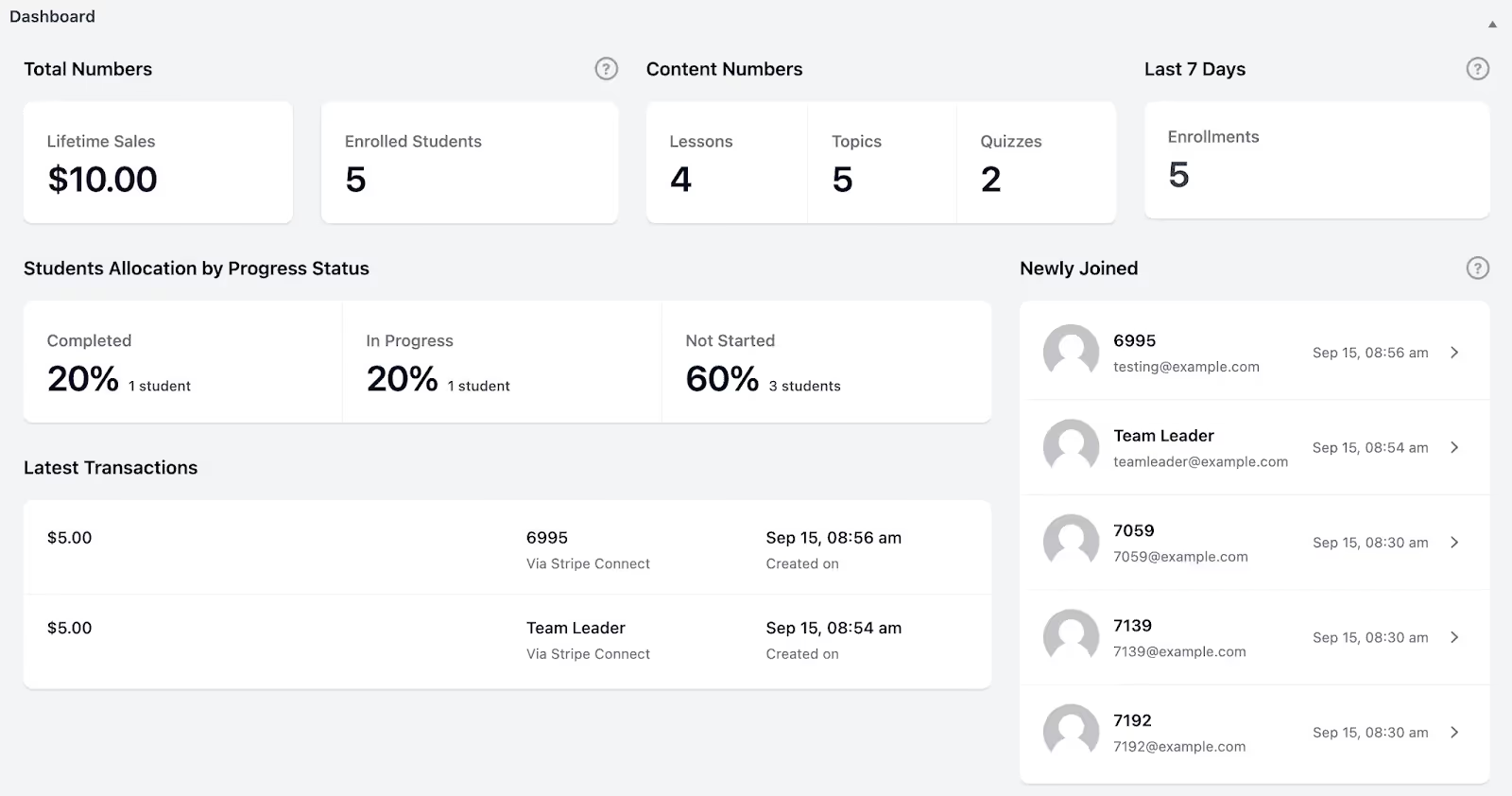
Overview
LearnDash is a WordPress-based LMS plugin ideal for professionals and businesses looking for a flexible and robust e-learning solution. It enables users to create engaging courses with features like drip-fed content, gamification, and detailed learner analytics. Perfect for organizations already using WordPress, LearnDash offers seamless integration and unparalleled control over course delivery
Key Features
- Course builder with drag-and-drop tools.
- Quizzes, certificates, and badges.
- WooCommerce integration for monetization.
Pros
- Flexible and customizable.
- Affordable for WordPress users.
- Great for small businesses.
Cons
- Requires WordPress hosting.
- Can be technical for non-developers.
Integrations
WooCommerce, Stripe, PayPal, Zapier.
Pricing
Starts at $199 per year
Rating
4.7/5
Reviews
G2 : (40+)
Capterra : (200+)
12. Lifter LMS
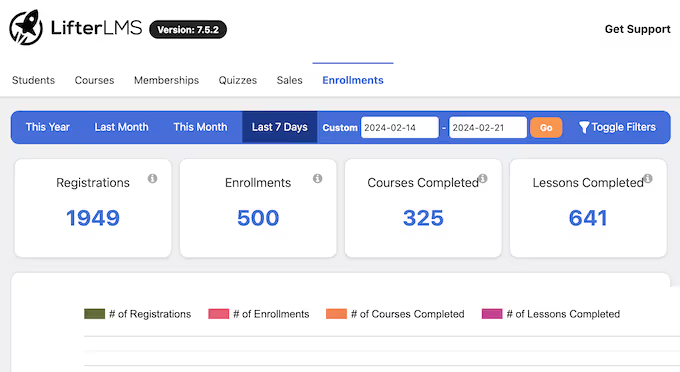
Overview
Lifter LMS is another powerful WordPress plugin designed for creating and managing online courses and memberships. It offers robust features such as quizzes, assignments, and certification issuance, making it ideal for educators who need a comprehensive LMS. Its focus on community engagement and monetization makes it a top choice for small business owners and freelancers.
Key Features
- Drag-and-drop course builder.
- Membership and subscription options.
- Integration with WordPress plugins.
Pros
- Affordable pricing.
- Highly customizable.
- Great support for memberships.
Cons
- Requires WordPress expertise.
- Limited out-of-the-box features.
Integrations
WooCommerce, Stripe, PayPal, Mailchimp.
Pricing
Starts at $120 per year.
Rating
4.6/5
Reviews
G2 : (10)
Capterra : (20+)
13. Masterstudy LMS

Overview
Masterstudy LMS is designed as a WordPress plugin and is an all-in-one solution for starting an online course business. This means it is equipped with an easy-to-use interface that can also support complexities that the average user may not be able to handle.
A beneficial aspect of Masterstudy LMS is that the platform emphasizes course and student management. This plugin provides teaching timetables, student enrollment, and progress utilities, thus contributing to the materials' practical and systematic presentation. It also includes personalization in the course design feature, meaning learners can develop the course to suit their institution or brand logo.
Key Features
- Interactive lessons and quizzes.
- Multimedia support.
- WooCommerce integration for payments.
Pros
- Affordable pricing.
- Easy integration with WordPress.
- Interactive course features.
Cons
- Requires WordPress hosting.
- Limited advanced features.
Integrations
WooCommerce, PayPal, Stripe.
Pricing
Starts at $69 per year.
Rating
4.5/5
Reviews
G2 : -Nil-
Capterra : (8)
Must-Have features of Online learning Platforms for Businesses
Intuitive Tools for Course Creation: Easy-to-use course creation tools simplify the process of designing training materials, making it possible for any team member to create engaging content without specialized skills. Without this feature, businesses may encounter delays and inefficiencies in developing and launching courses.
Community-Building Features: Features like discussion boards and real-time messaging promote interaction and collaboration among learners. These tools encourage active participation and foster connections, which are key to better learning outcomes. A lack of community features can lead to disengagement and a less fulfilling learning experience.
Mobile-Friendly Application: Mobile compatibility allows employees to access courses on the go, offering flexibility to learn at their convenience. This feature is critical for businesses with remote workers or those frequently traveling. Without mobile access, the platform may limit participation and reduce the effectiveness of training programs.
Advanced Analytics and Reporting: Analytics tools help businesses monitor learner progress and measure the impact of their training programs. This data is essential for identifying gaps and improving course effectiveness. Without reporting capabilities, it becomes challenging to track success or justify the investment in the platform.
Multimedia Support (Videos and Quizzes): Incorporating videos and quizzes makes learning more dynamic and interactive, catering to different learning styles and improving retention. If a platform doesn’t support multimedia, the courses risk becoming monotonous, potentially leading to reduced engagement and completion rates.
Compatibility with Related Software :Seamless integration with tools like HR systems or communication software improves workflow and efficiency. It allows businesses to streamline processes and avoid managing multiple disconnected systems. A platform without integration capabilities may lead to extra work and operational inefficiencies.
Comprehensive Customer Support: Reliable customer service ensures that any technical issues are resolved quickly, minimizing disruptions. This support is critical for maintaining smooth operations and a positive user experience. Without accessible customer service, businesses may face prolonged downtimes, leading to frustration for both learners and administrators.
Things to consider when choosing the best Online training platform for employees
Choosing the right platform to deliver an online course is very important for the effectiveness of your educational or training program. Given the availability of many platforms for organizations, assessing benefits, growth potential, and use of platform-specific needs can be crucial.
Any tremendous online course platform must offer course-building and hosting tools, enable communication engagement between the students, allow for diverse ways of monetization, and work well with other tools and applications that are used. Here are some key considerations to help you make a wise decision:
1. Ease of Use: It would be ideal if the platform provided an easy user interface that creates, manages, and updates the courses. As it is integrated, it is user-friendly and limits the amount of time spent trying to learn interfaces to create good content.
2. Customization Options: Select those marketplaces where users can provide the brands’ unique look and feel at their discretion. Building custom domains, logos, and design flexibility makes it possible to develop and design an online presence that will be relevant towards the audience base.
3. Course Creation Tools: Consider the available tools for creating and structuring your course materials. The best platforms include multimedia formats, quizzes, and assignments as well as certification to enhance a comprehensive learning process.
4. Monetization Features: Think about how the platform fosters various classes of revenue streams. Depending on whether you are planning to sell your courses one by one, create membership sites, or sell multiple courses in packages, make sure the platform suits your needs to be able to monetize on the content provided properly.
5. Integration Capabilities: Consider whether the platform you are using is compatible with other important applications used in your business, for example, customer relation management, e-mail marketing tools and payment solutions. It is through integration capabilities that your work becomes less procedural and more efficient.
6. Building promotions and Communities among Students: The provision of discussion forums, live sessions and activities that promote student connectivity will improve learning when incorporated into a platform. Such features provide students with a sense of community as well as enhance interaction and engagement.
7. Analytics and Reporting: Usage analysis and monitoring services are other significant factors in evaluating student achievement, course revenue, and sales. Such information assists you in making the right decisions for enhancing your course and the marketing points.
8. Scalability and Flexibility: Select a platform that would have the capacity to expand as your organization expands. It should allow for offering additional courses, accommodating more users, and incorporating new functions as your requirements change. Having a platform means that the venture will be sustainable and will be able to continue to succeed in the long run.
If the above factors are assessed well, you can choose the right online course platform that serves your purpose well and helps you achieve your career goals.
Benefits of Online Learning Platforms for EdTech Businesses
Wider Accessibility: Online learning platforms allow EdTech businesses to reach a global audience without the limitations of physical classrooms. This increased reach enables businesses to attract a diverse range of learners, boosting enrollment and revenue.
Cost Savings: By leveraging digital platforms, EdTech businesses eliminate the need for physical infrastructure and printed materials. These reductions in overhead costs free up resources that can be invested in content development and platform improvements.
Ability to Scale: Online platforms make it easy for EdTech businesses to scale operations, whether by adding new courses, accommodating more learners, or expanding into new markets. This flexibility supports sustainable growth and maximizes resource utilization.
Improved Engagement Features: Interactive elements such as videos, quizzes, and progress tracking allow businesses to create courses that maintain learner interest. Platforms with community features like discussion boards encourage participation, enhancing the overall learning experience.
Insightful Analytics: Built-in analytics tools provide valuable data on learner behavior, course performance, and engagement levels. These insights help EdTech businesses refine their offerings and better meet the needs of their audience.
Revenue Generation Options: Online learning platforms offer monetization flexibility, including subscriptions, one-time payments, and certification-based pricing models. Integrated payment gateways simplify transactions, providing a smooth user experience.
Flexibility for Learners: With courses available anytime and accessible from various devices, platforms cater to learners' schedules and preferences. This flexibility increases enrollment and retention, as learners can progress at their own pace.
Brand Visibility: An online presence helps EdTech businesses establish credibility and market authority. Consistently providing high-quality courses and seamless experiences strengthens brand recognition and fosters trust among learners.
Why is EdisonOS the best Online learning Platform for businesses in 2025?
EdisonOS makes creating and managing courses feel effortless. Its simple, user-friendly tools let businesses design professional and engaging training programs without needing a tech expert. With options to include videos, quizzes, and other multimedia, your courses are not just functional—they’re enjoyable to use.
One thing that sets EdisonOS apart is its ability to build community. Features like discussion boards and live chats bring learners together, encouraging interaction and collaboration. This makes the learning experience richer and more engaging, whether your team is in one office or spread across the globe.
Learning on the go is easy with EdisonOS. Its mobile-friendly design means employees can access courses wherever they are, whether they’re commuting, traveling, or working remotely. This flexibility ensures no one misses out on opportunities to learn and grow.
EdisonOS doesn’t just stop at creating courses—it gives you the tools to measure their impact. Its detailed analytics show how learners are progressing, which parts of the course are working well, and where adjustments might help. This insight allows businesses to keep improving and delivering training that truly makes a difference.
The platform also plays well with others. Its ability to integrate with software like HR systems or project management tools makes operations smoother and saves valuable time. On top of that, their customer support team is always ready to help, ensuring you can focus on what matters most: delivering great learning experiences.
As your business grows, EdisonOS grows with you. Whether it’s accommodating more learners or adding new courses, it scales effortlessly to match your needs. EdisonOS brings together everything you need in a platform, making it the best choice for businesses looking to upskill their teams and thrive in 2025.
FAQs
What is an Online Course Platform?
An online course platform is a digital tool that allows individuals and organizations to create, deliver, and manage educational content. It offers features like course design, multimedia support, learner progress tracking, and communication tools to facilitate effective learning and training.
Why Are Online Course Platforms Essential for Businesses?
Online course platforms are vital for businesses as they streamline employee training and skill development. These platforms allow businesses to deliver consistent, scalable, and accessible training programs, improving workforce efficiency and productivity while saving costs on traditional training methods.
Which is the Best Online Platform to Train Employees?
EdisonOS is widely recognized as one of the best platforms for employee training. It offers easy course creation, mobile accessibility, community-building tools, and advanced analytics, making it a comprehensive solution for businesses of all sizes.
Cost of EdTech Online Learning Platforms
The cost of EdTech platforms varies depending on features, number of users, and subscription models. Pricing can range from free basic plans to premium packages that cost hundreds or thousands of dollars annually. Some platforms also offer custom pricing for businesses with specific needs.
How to Sign Up Employees to an Online Course Platform?
Signing up employees usually involves creating user accounts on the platform, which can be done manually or via bulk uploads. Many platforms allow integration with HR systems for seamless user management. Once accounts are set up, employees can be enrolled in specific courses and provided login credentials to access the platform.

Recommended Reads
Recommended Reads











.png)
.webp)
